It was a cloudy day in London. I just finished the exam. I laid down my mechanical pencil and asked myself: “Why on earth am I doing this again?” My hand hurt, I was tired, and my heart rate was still too high.
That was my 4th BJCP Tasting Exam. It had been a challenging endeavour. I felt exactly as I did after completing my first-ever BJCP Tasting Exam, 8 years before. Weary and somewhat upset. But a little relieved. It was done.
After a quick chat with the other examinees, I went to the bar and ordered a pint to calm down. The exam administrator then arrived, and the proctors began discussing the six beers we had sampled and their opinions about them.
The exam admin went along unveiling what beers he had selected.
For me, everything began out pretty well. Even the brand of Czech beer we tried was something I had guessed. I was elated.
My heart skipped a beat as we reached the fifth beer, a three-year-old homebrewed Barley Wine. My score was a long way off. I performed even worse on the score for the final beer, a combination of a hoppy Duvel and a homebrewed Tripel.
Duvel is one of my favourite beers of all time.
I’d have needed at least an 86 to get to the Master level. After that chat with the proctors, I doubted I succeeded. I quickly calculated my Scoring Accuracy and found that it was just about at the Low National Level (a tad lower). The same scoring accuracy as my last test, in which I received an 80 out of 100 final score.
I was overwhelmed with emotions. Yes, I am the sensitive one. I had put a lot of effort in preparing for this test. And—seemingly—it didn’t pay back.
I felt the urge to storm away and get smashed. Fortunately, I was in London with a number of judges who were very supporting and easy-going. After that chat with the proctors, we all walked to the Beer Mile. We enjoyed a few pints of Anspach & Hobday’s Nitro Porter and laughed about the test. The day eased off.

That was it. The next day I went for a couple of wonderful pints to the Harvey’s Tavern in Lewes, than took my flight back to Rome. All I had to do was wait for the results to come back.
They arrived yeasterday, a few months later. A stunning 91/100! I still can’t believe it. I achieved a 92/100 average on the Written and Tasting exam. I have become a Master-level BJCP judge.
All of the practice and study eventually paid off.
How did I accomplish that? Let’s delve into it.
My Tasting Exam in London
I surely didn’t do that great on Scoring Accuracy. Beers 5 and 6 were the problem. I was probably growing weary and losing concentration as long as the exam went on.
I was aware that test anxiety might cause scoring to get a little confusing. Furthermore, the proctor’s score affects scoring accuracy. Scores can occasionally differ, particularly when stylistic considerations are taken into account. For this reason, I devoted the majority of my study time on honing the three abilities that I had total control over when taking the test: Descriptive Ability, Completeness, and Feedback.
For all three of these abilities, I advanced to Master level compared to my last Tasting Exam where I was stuck at National level. That made the difference.
I also did far better on Perceptive Ability on the first 4 beers, with 3 of them at the Master Level. That is because I had a lot more tasting experience compared to my previous exams.
The key to improving Descriptive Ability, Completeness, and Feedback is a lot of practice. Writing scoresheets requires drinking, and I couldn’t drink that much over a long period of time. No one should. So I started writing scoresheets of imaginary beers, just for practice. It worked out.
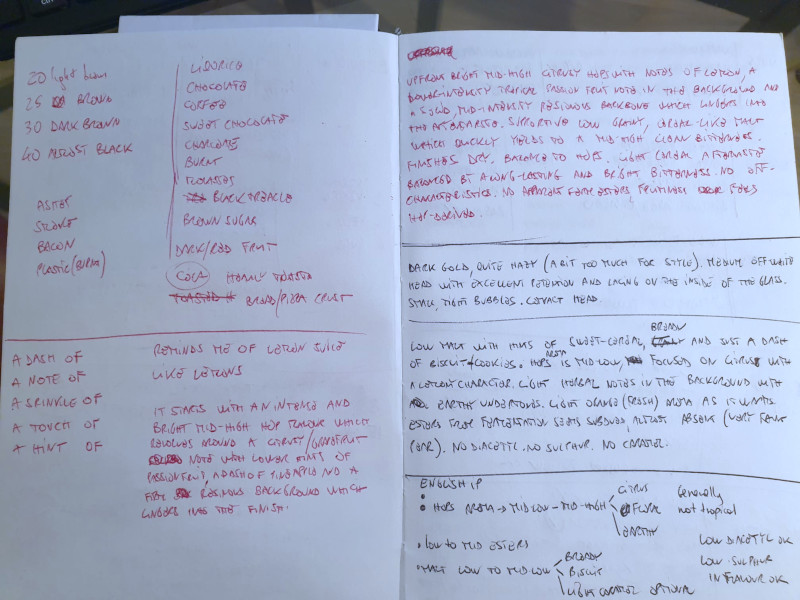
It also takes a lot of reading to write a great scoresheet. Internet or magazines evaluations of beers may be a reliable source; however they are sometimes overly verbose and ostentatious. A BJCP scoresheet isn’t the place for that kind of writing.
I read a lot of scoresheets instead. Both good and bad.
How did I do it? I became a Grader. Before taking this exam I had already graded 4 Exam Sets, which translates into thoroughly reading almost 70 scoresheets. As a grader, you get comfortable with the scoresheets, knowing exactly what a grader would expect you to write.
I talked about becoming a grader in a previous post. If you are a National-rank judge, please join in. It is a lively community of knowleadgeable people and you will help the program.
There are also several scoresheet examples online (link), but they are quite outdated.
Of course, you don’t have to be a grader to pass the tasting exam with a score of 90+. A little bit of luck with the scoring and more tasting experience would likely be required. And, I suppose, more practice.
As for the Feedback Ability, excellent knowledge is essential. It takes time to hone this. I had previously done a lot of studying for the Written Exam, so I was prepared. I just needed to be efficient and well-organized to quickly get all the information I required from my memory.
I could have easily had a higher score if I hadn’t lost concentration on the final two beers. But I won’t be too hard on myself. I am where I wanted to be. However, I know that I still have a lot to learn. The journey continues!
Here is my Tasting Exam:
A list of some of the blog’s BJCP resources that are relevant to the exam:
- Tasting Exam / My first try (Italian)
- Tasting Exam / Study resources (Italian post, English resources)
- Tasting Exam / My second try (Italian)
- Tasting Exam / My third try (Italian)
- Tasting Exam / How to improve your Scoring Accuracy (Italian)
- Written Exam / How it works + Random exam generator (English)
- Written Exam / Random style generator (English)
- Written Exam / How I got a 93/100 (English)
- Written Exam / How to answer the T/F questions (English)
- Written Exam / How to answer the Style questions (English)
- Written Exam / How to answer the Recipe question (English)
All the BJCP-related reosurces on this blog are easily accesible here (most of them in English).

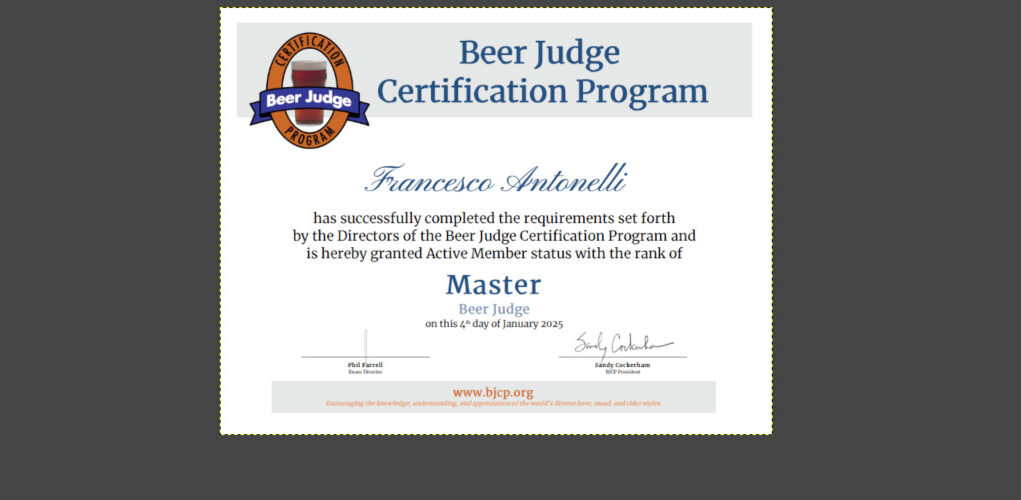
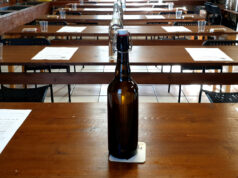
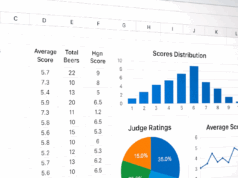
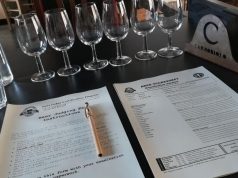
Congrats, Frank! 🎉 Your blog and the resources you shared were a huge help while I was preparing for my written exam. Just got my results back. I scored an 88!
Not fully satisfied though, since I’ll need a 91 in tasting to reach Master (my highest so far is 87). I’d really prefer not to retake the written…it takes about two months of part-time study. Hopefully I can hit 91+ in my next tasting exam, likely by the end of this year or early next year.
Great, that is an excellent achievement! I’m glad you found useful material on this blog.
I recommend doing some exam grading before retaking the tasting; it’s a great help to improve your score. Also, giving back to the BJCP community is a really noble thing. Have you read this post I wrote on the topic? Cheers!
https://brewingbad.com/2024/11/how-to-become-a-bjcp-grader-and-why-it-will-be-good-for-you/
I did! I already contacted our regional director and expressed my willingness to volunteer as a grader. Plan to grade my own previous exam again, following the BJCP grading guideline. For me, Descriptive Ability, Feedback, and Completeness are all now in mid-national level. If I can push them to master, a 91 shouldn’t be a problem for me.
That’s great!
Vence here who is preparing another tasting exam next month to hit 91 of master. I’ve been using Gemini to practice OI and it’s somewhat fairly knowledgeable and effective. However, I feel like one input from Gemini about “not making assumption” is weird and would like to have your input.
Due to the limited time in the exam, I’ve been trying to provide very brief and straight solutions for flaws or style issues. Take T2N (oxidation) for example, I will say “ensure cold storage, prevent splashing the wort post-fermentation, or use antioxygen caps could help”. AI said this is “makiing assumption” and suggest a less commanding and indirect tone. AI prefers “consider evaluating post-fermentation handling to minimize any oxygen pickup during transfer or packaging, focusing on cold-chain storage and using oxygen-absorbing crown caps, assessing brewhouse techniques to reduce cold side aeration such as avoiding vigorous splashing of wort could help”.
I understand in case of judging it’s more polite and less commanding but I feel like it’s not realistic for an exam due to the time constraint. Do you think my current approach would loss some points in “no assumption” or other rubrics in feedback?
TIA
In my opinion, your answer is more than fine; I don’t see any major assumptions. I would write “beer” instead of “wort,” since we are talking about the stage after fermentation. I would also recommend capping over the foam, as the effectiveness of oxygen-blocking caps is limited. But these are minor details, nothing that would deduct points. You could also mention avoiding oxidation of the wort during the hot production phase.
Thanks! I think that’s the flaw of AI now…for some reasons it’s very knowledeable in chemsitry and techinical solutions, but sometime it makes obvious stupid mistake or gone too far.